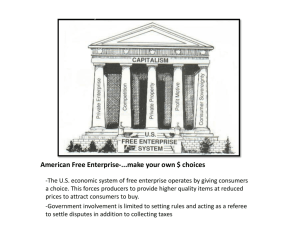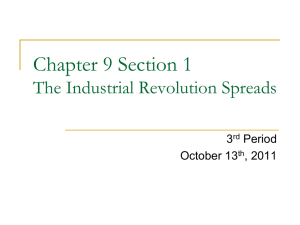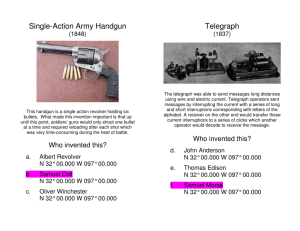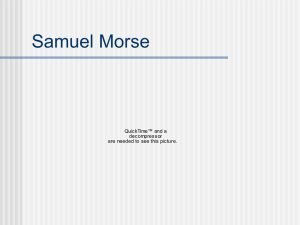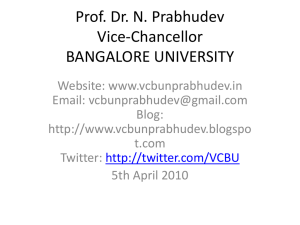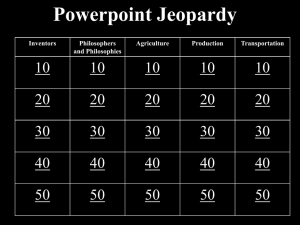Chapter 11 – Industrial Inventions early 1800s
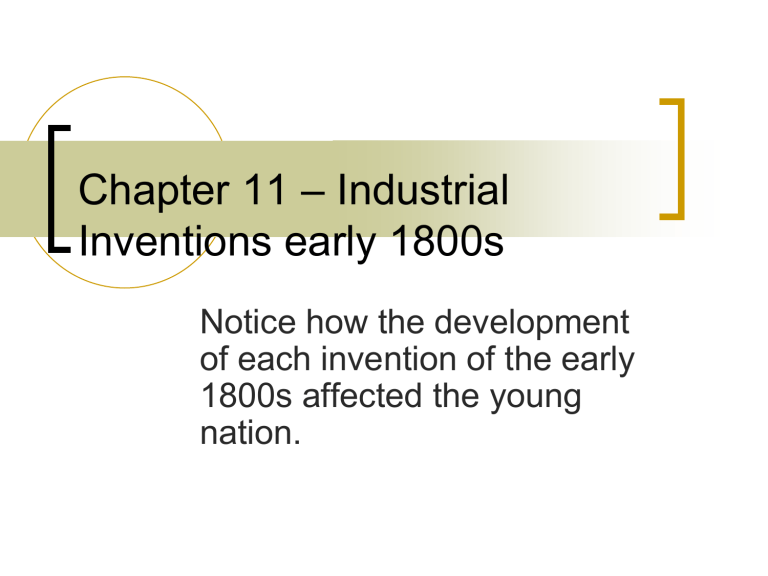
Chapter 11 – Industrial
Inventions early 1800s
Notice how the development of each invention of the early
1800s affected the young nation.
The Spinning Jenny &
Power Loom
Textile mills brought many workers & machines like these under one roof in factories powered by water wheels. People left farms for cities and created the growth of many towns in New England near rivers to turn the water wheels.
Textile Mills helped growth of towns in New England states.
Eli Whitney’s Cotton Gin
In 1797, The U. S. government hired inventor Eli Whitney to make 10,000 muskets for the army. He was to have the guns ready in two years. In 1801, he showed G. Washington a box with piles of musket parts. He took a part from each pile and assembled a musket in a matter of seconds. He had just demonstrated the use of interchangeable parts
– parts were all exactly alike.
Interchangeable Parts
Parts that are exactly alike was Eli
Whitney’s idea when he tried to put the musket together in seconds.
Machines that produced exactly matching parts soon became standard industries
Made repairs easy
Used low pay and less skilled workers
New Inventions – The Claremont made the 300 mile trip from New York to Albany and back in 62 hours in 1807.
The Steam Boat invented by Robert Fulton
Steam engines
The steam boat could move against the current of the river and the wind
Led to the growth of cities like New
Orleans and St. Louis
Shreve also invented a better steam boat. The town of Shreveport, LA was named after this inventor.
Shreve’s double decker steamboat and a paddle wheel in the back 1816 it went UP the
Mississippi River!!!
The Telegraph…..
The Telegraph
Invented by Samuel Morse
Long and short pulses of electricity along a wire ( dot, dot dash…--..)
Took seconds to communicate to other cities
Brought about national unity!
--…---
Morse Code
John Deere’s steel plow
John Deere’s Steel Plow
John Deer invented the light weight steel plow with a steel cutting edge.
Older cast iron plows were designed for the light sandy soil of New England.
But rich clay, like the soil of the
Midwest needed a sharper blade of steel . More farmers moved to the
Midwest with the help of this new plow.
The Mechanical Reaper
*The Reaper & the threshing machines helped improve agriculture.
*They were made by Cyrus
McCormick in 1834.
*The thresher separated kernels of wheat from husks.
*The reaper cut ripe grain quickly.
The Factory System
Workers and machines came together under one roof, usually near a source of water to power the machines.
Industrial Revolution
Machines replaced hand tools, and large scale manufacturing replaced farming as the main source of work.
Patents
Protects the inventor who has the
SOLE right to make and sell the invention.
Name the Inventor
Samuel Slater stole idea of textile mill from England.
Francis Cabot Lowell –he had 22 mills and created the textile factories in
New England brought power looms from England
Eli Whitney - inventor of cotton gin & interchangeable parts.
Name the Inventor
Samuel Morse
John Deere
Robert Fulton
Henry Miller Shreve
More inventors
Robert Fulton – invented steamboat
Sam Morse – invented telegraph
John Deereinvented the steel plow
Ch 11 Section 1 review
Name an invention and tell how it affected or impacted our young nation.
Why was New England a good place to build factories?
Which inventions did most to link the nation?
That’s all folks……….
